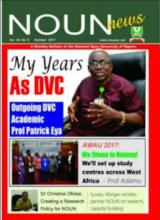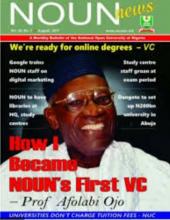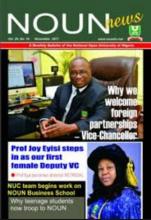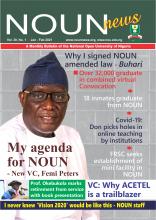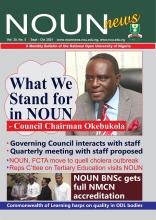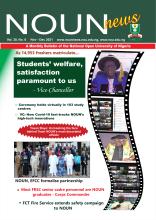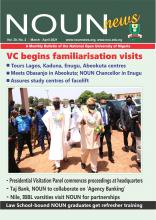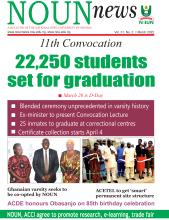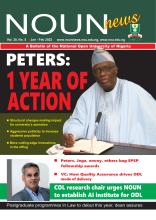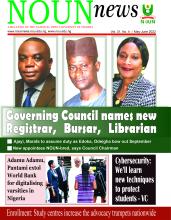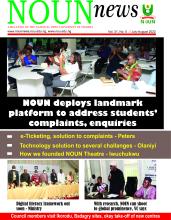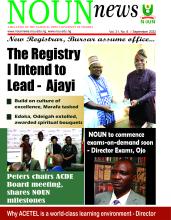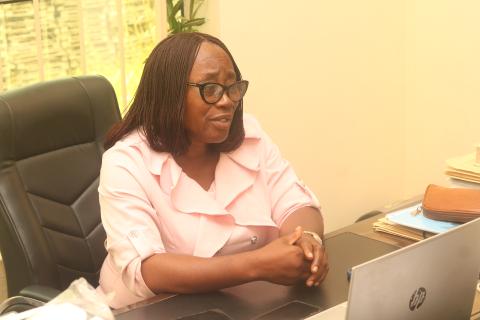
Dr. Sefinat Omuya is the immediate-past Director, Directorate of Learner Support Services (LSS) and currently the pioneer Director of the new-created Directorate of Counselling and Career Development, National Open University of Nigeria (NOUN), which came to being earlier this year. The soft-spoken, meticulous and detailed personality, took NOUN News correspondents: Debbie Nduba and Ibrahim Kabiru Sule through a sail cruise on the nitty gritty of counselling and career development for students and staff, what informed the creation of the directorate as well as other sundry insights into the blosooming sector. Excerpts:
Can we know who is Dr. Sefinat Omuya?
I am Dr. Sefinat Omuya. I am the Director, Directorate of Counselling and Career Development. Before now I have acted as the Director in the Directorate of Learner Support Services. My background has always been from the background of guidance and counselling, from my first degree through PhD guidance and counselling and I am passionate about student, personally. I don’t give up on anyone, I still believe no matter how bad or terrible it is, something can be done about that person and with that I still do my work as a counsellor before I eventually end up on this seat as the Director of Counselling and Career Development.
When were you appointed as the Director, Counselling and Career Development?
I was appointed to this position January, 2025.
Was it also the time the directorate was created because from what we used to know it was the Directorate of Learner Support Services. What informed the creation of this directorate?
Yes, what really informed the creation of the directorate has to do with TETFund and the NUC. For TETFund, there is a grant for carer services centre; it stems out of the fact that here if you look at the system very well, we have so many people graduating, they can’t get job and we are meant to understand that it’s because some of them don’t have employability skills, some of them don’t have the skills for public service. So I think from that point of view, TETFund intervening in so many areas, felt that there is no point chunking out graduates and not getting job. Some went into particular profession because they were ignorant, some of them don’t know, some went in because they were looking for a degree. None of them asked: so after this degree where are the opportunities? What will I be doing so that I will be useful in the work space? So this has become a very serious issue for the nation Nigeria and I believe that is one of the major reasons TETFund is not saying we should have it, not only having it, but they are providing the funds for us get it and for us to get the funds/grant. There must be physical facility on ground, there must be a space dedicated for that purpose and that was what informed the creation of Directorate of Counselling and Career Development.
With this, I am sure that a lot of people will want to know whether we still have LSS, having been the director there?
I want us to understand one thing that LSS is a different directorate, different segment within the university, which provides support for our students. If you mention ICT, they are providing support, if you mention MIS, they are providing support, even registry. It is just that mainly in LSS. Before now the main hub all these other directorates providing support, they all have their directorate and the thing is the major group that really made LSS is the counselling at the study centres but there are other activities connected to it. We have the centre directors and what they do at the centres, for now because the main group in that LSS has been taken away because of what I mentioned earlier now is not there. There is no learner support again but it has been shifted to another place, the person supervising the activities of the study centres now is the DVC Administration. This is the way it is. All the other groups they have their directorates to conduct and we have to do this to better supervise our counsellors to ensure that we get the work done.
In essence, we still have relationship with the study centers but the only difference is that their activities of the directors are being managed by the DVC Admin. But when it comes to the activities of the counsellors in the centres, they interact with us in this directorate. We also have some directors that are counsellors now; they still relate to the university though, they have to report to us as a directorate via the VC.
Based on the demand of NUC and TETFUND, is there anything that has changed after being confirmed as a directorate, something like physical facilities, etc.?
Yes, though we didn’t start early enough. For now, we have submitted, because there are procedures. Yes, we have not gotten the grant that’s why you have not seen some few things you are expected to see. But we have been able to submit the establishment plan; we are expecting them possibly to tell us that we can ask for the fund. For now, nothing. But we have been conducting a lot of training for our counsellors to prepare them. Yes, we were doing counselling before now and career guidance and counselling but this time we have to pay attention to career services and developmen. It is not just telling someone this is the course, this is what is expected of you, etc. There are certain skills we need to train them on before they leave the university and some of these employability, soft skills. We are already digital so we need to let them know this and encourage them. Life is more than getting a first class because I have seen a first class roaming but 2:2 gaining employment. I am not saying godfathers, but people who skilled themselves, we have first class but not skilled and the work space now is looking for skilled persons in all these soft skills that are enhanced in the system. All these things we will be doing, but we are already dong virtual training for our counsellors. At least, there’s one we do once in a month but we have to step it down now because of the ongoing exams because they are engaged in that. So these are some of the things we are doing to put everything in place before the funds starts coming in. For the first things, what we have done now is indication of what we need to function well, once the approval comes, we will get all of these and do the needful for our students.
Can you tell us briefly about your achievements so far?
We have successfully been able to send in our establishment plan to TETFund. Originally, when we started in NOUN, we have a responsibility to play, at a point there was a lacuna, at a point it was as if the work of counsellors in Open University was really played down and there was a kind of confusion. You see a registry staff doing the work of a counselor. For now, we have been able to streamline that, looking at where we are now, and to suggest to the university that there is a need to look into the roles of counsellors and we have suggested what the roles of counsellors should be at the various study centres. For now, atimes some students don’t even see counsellors, because we have desk officers, admin staff that do the screening. It has not been easy, we have not been able to get that back, because some students will come and once they finish with the admin officer, off they go. They don’t even know there are counsellors. It is been a lot of struggle.
I have tried to let them know that the problem we have in study centres now is that the presence of counsellors are not felt and at a point we don’t have enough counsellors. If you remember a time when we have to do an internal recruitment for our staff that needed to be upgraded ,we have to convert them to counselors and subject them to training. So there was a whole lot of gap. Even some of the counsellors were not doing counselling work but admin work so we are trying to reposition that.
When I started as counsellor in NOUN, I knew what we did; I knew what we imparted to our students. We are trying to re-emphasise those roles we play and they should be allowed to play that role. We are not trying to take the responsibility of admin. But at the same time, counsellors are within the system. Some one can tell one you will fail, but there is a way counsellors will professionally say it, find a way around it and improvise some remedial. A counselor will open you up around the fact and allow you take decision, we don’t decide for you but allow you see various paths within a challenge then allow you to make choice. Secondly, when it comes to training for counsellors it has been on the down side and if we continue to use what we learnt about 30 years ago we might not be doing the right thing because things evolve everyday. So what we did as a directorate was to start monthly lecture series and we are trying to take us through the new ones among us; learning something new and old ones are being reminded of what is expected of them and what they need to remain relevant in the present practice.
Our students, like you said, hardly talk to counsellors but admin officers. Having become the director now, is there anything new we should expect?
Thank you very much. I would have forgotten the vital thing we are dong now, because we know the flexibility in NOUN as well as our students not being together. So there is a lot of diversity; different category of students as part of our population and because of that, there are ones that need counselling that cannot come to the study centre, they can not really see a counsellor physically. We feel there is need to deploy counselling virtually. So when I came in I wrote to the VC that there is need for us to have e-counselling for them to be able to access the need of counselling without visiting the study centre and the VC approved it and we are working on it. I don’t really know what is holding us from launching because the software is ready. We have done a demo but anytime soon we will launch and be able to deploy.
Again, this directorate is not only for students; staff can as well come for counselling. There are different areas of counselling, some staff are still developing themselves, and there are things you may not be cleared about. It is equally open to staff. Some people have issues that they tend to find it difficult discussing with people, I don’t blame them because of no confidentially but with a professional counselor be sure of confidentiality. But for issues that are life-threatening you have to let the client know that this has to get to people that will help. As in the consent, we have mental, burn out counselling. Once we receive the necessary fund, I bet you the university will be proud that they have a directorate called directorate of counselling and career development. We have so many things we planned to do but not until we deploy the e-counselling and getting the funds. But at the study centres we have told them, pending when the e-counselling will be on, there are so many medium to be used to reach our students: Facebook, WhatsApp and email, to counsel.
So where are we going to see the counsellors here at the headquarters?
We have some counsellors here. Recently, we employed some professional counselors. In fact, after so many years some professional counsellors were employed for the first time, not the converted ones.
Recently, the VC mentioned that NOUN has the largest number of counsellors. In what ways will that help the directorate?
Initially, I mentioned that there was a vacuum, you won’t believe that in the whole university, before this set of staff were converted into the counselling unit, the whole university, we have about 50 counsellors and from these 50 counsellors, we have a good number that are already centre directors. So the people we can say are counsellors were 40 something or thereabouts compared to about 127 study centres. Definitely, it is inadequate. In fact, that’s why taking back the role of counsellor is becoming very difficult, because before then there were no counsellors and other people had to step in to take that responsibility and they have done it. But before now, there was a vacuum but if per adventure, if you had 100 counsellors before now, 80 were converted, you can be sure it will change the narrative considerably. It is still work in progress. Yes, we have taken them through some rudiments but it will take us some time to say: ‘yes, we have some counsellors.’ But you know atimes, passion for something really helps. We are getting the fillers that even the converted ones are doing well, because they have the passion, even when they don’t know they ask questions.
You have already touched about this, but can tell us the challenges thus far?
I must be plain. There are a lot of challenges. You know atimes people that you think should understand what the role of counsellors entails, atimes, they take it as If they don’t know what it is. It is unfortunate because how do you explain someone saying anybody can do counselling work? It’s not correct that you went and study counselling does not make you a good counsellor until you go in to practice. What is still keeping counselling today is just that when NUC is going for accreditation and if they don’t see the presence of counsellors there, the best you can get for that programme is interim. You can’t get full accreditation.
Another thing is that there is need to train counsellors. I left university 1992 and I have been building myself. It is not everyone that will that opportunity. If you want to get the best from our counsellors you must train them, that’s the truth. What we learnt over 30 years ago will not be sufficient for the present. Counsellors should not be subjected to counselling trainings alone. If you get to a certain position there are trainings you should be exposed to build you up. There is a need for building people up for succession; there is need to employ more counselors, going by the number of study centres we have. The current VC has tried to beef it up bu there is still need to employ more.
Is there any peculiarity with counselling in institutions like our own compared to other conventional ones?
Yes, the peculiarity is there and it stems from diversity that is within NOUN. If you compare NOUN with other conventional universities, you will realise that you have the younger population in conventional universities compared to what we have in NOUN, though we have young and older ones, too. So because of this diversity there is a need for us to plan and secondly to know how to even deploy the counselling we are talking about, because how you will speak with younger ones is different from adult. That is the peculiarity and you know some of them returning to study, you can hardly see 40 years returning to study in conventional universities, that population is negligible but in NOUN, you can see a 60-year to 80-year individuals being given the opportunity. Some of them have been out of school for a long time and that is when you need someone to guide them and that is where the counsellor comes in; and that’s where there is difference between a counselor and an admin.
Do you have any message which you want to share to the university community and the general public?
I want to appreciate the Vice- Chancellor, Prof. Olufemi Peters, because whatever we do and wherever we are today, it is just because he gave us the support. He has tried to do a lot of things.
The concern of a counselor is to see our students doing very well and ensure that students engage with their studies and to as much as possible reduce attrition rate and that is what we work towards and that is why you see us. We want to make sure we do our work as much as possible, even when students want to walk away, when they remember there are counsellors, they will come back. There were so many problems at the study centres before now especially when we were deploying our services manually, students would come with complain here and there. You compile and send to headquarters but you don’t get answer to them. But the Vice-Chancellor came and deployed e-ticketing, and those things that students write manually are being handled through e-ticketing now and it has relieved us from a lot of trouble and has also helped the students. The directorate really appreciates the VC for all his support.
- Log in to post comments
- 233 views

